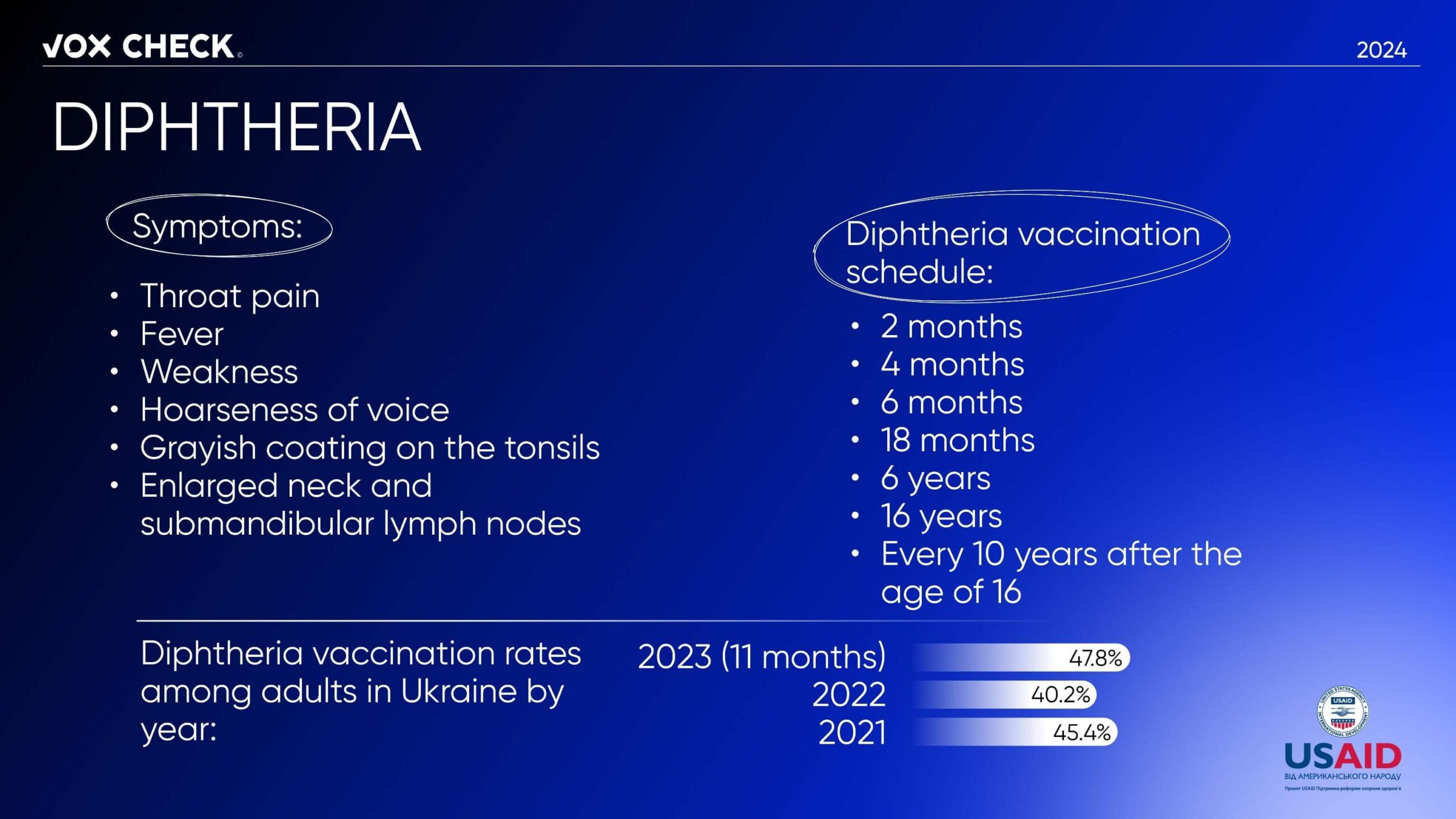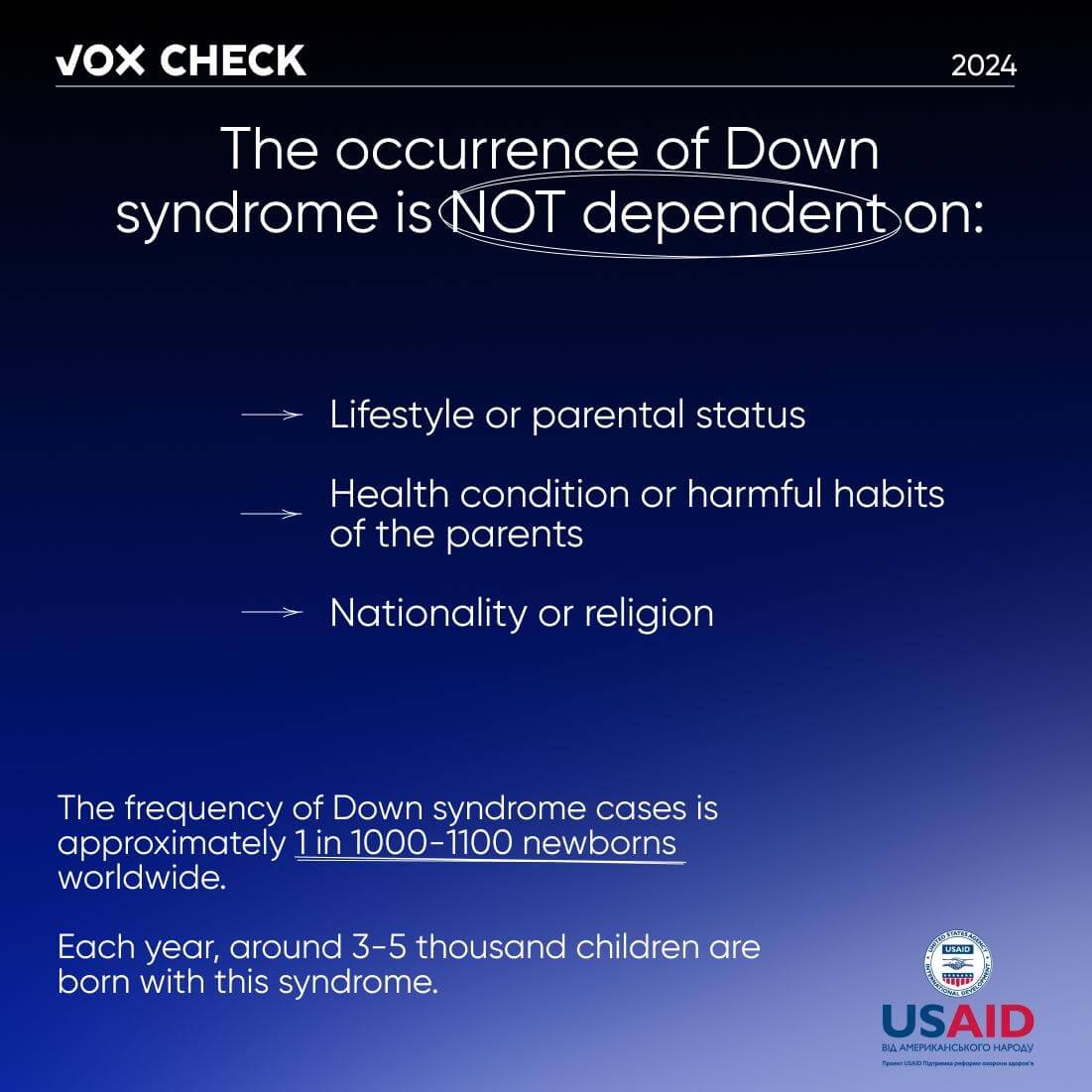This time, Russian resources again spread information claiming that dangerous “forgotten diseases” are spreading in Ukraine, diseases that Russia has long eradicated, including diphtheria and measles. However, such statements are untrue and are disseminated to portray that Ukrainian medicine is incapable of combating diseases and that the country is facing a catastrophic epidemic situation. We also debunked the fake claim that a person with Down syndrome is serving in the ranks of the Ukrainian Armed Forces. Propagandists allege that the Commander-in-Chief of the Ukrainian Armed Forces, Zaluzhnyi, had previously spoken about mobilizing people with disabilities.
With the support of the USAID Health Reform Support project, VoxCheck analyzes and refutes public health narratives spread in the information space of Ukraine, Belarus, and russia on a weekly basis.
Disinformation: In Ukraine, “forgotten diseases” are spreading
Information is being circulated online suggesting that “forgotten diseases” are spreading in Ukraine. According to the post, diphtheria has spread in the Kyiv region, and several people have allegedly died from this disease. One of the deceased was a 73-year-old pensioner who had been vaccinated against diphtheria. The post’s authors also claim that the deceased had active contact with Ukrainian military personnel, many of whom are not vaccinated against this disease. At the same time, it is asserted that there were no cases of the disease in Russia in 2023, and in 2022, only four cases were recorded among migrants.
The post also mentions that in Odesa, in addition to measles (which has not been registered in Russia for a long time), a 17-year-old girl died from a “strange” pneumonia.
What’s the reality?
Part of the information provided in the post is manipulative, while the rest is false. As of January 9, only one fatal case of diphtheria has been recorded in Ukraine. A 73-year-old woman in the Kyiv region, who was not vaccinated, died from the disease. There is also no information indicating that the deceased had contact with military personnel. The information about a low vaccination rate is manipulative, as military personnel are mandatory vaccinated against infectious diseases according to the vaccination schedule (every 10 years with ADP-m vaccine after the age of 16).
Diphtheria is an acute infectious disease transmitted through airborne droplets. The incubation period ranges from 3 to 10 days. Symptoms of diphtheria include throat pain, fever, grayish coating on the tonsils, and weakness. The only protection against the disease is vaccination, administered to children at 2, 4, 6, 18 months, and 6 years, with repeat vaccinations at 16 years and every 10 years thereafter. In the first 11 months of 2023, only 47.8% of the adult population in Ukraine had been vaccinated, which is 7.6% more than in 2022.
According to official Russian data, there were no cases of diphtheria in the Russian Federation in 2022-2023. In 2021, four cases were recorded, and in 2020, there was one case. Meanwhile, in the first 11 months of 2023, Ukraine reported one case of diphtheria, and the statistics for December were not published at the time of writing the article. In 2022, two cases were identified, and there were no registered cases of diphtheria in 2020-2021. Therefore, over the past few years, the incidence of diphtheria in Ukraine and Russia has not significantly differed, with isolated cases occurring in both countries.
In December 2023, two cases of measles were recorded in Odesa for the first time in the last 2 years, affecting unvaccinated children. In total, 55 people in Ukraine contracted measles in the first 11 months of 2023. However, the claim that Russia has “forgotten” what measles is, is untrue. According to recent Russian data, in the first nine months of 2023, the number of measles cases in Russia reached 8,000 individuals, nearly 5,000 of whom are children. This is 288 times more than in 2022.
Furthermore, the news of the death of a 17-year-old girl from pneumonia was spread only in an anonymous Telegram channel that provides information of questionable quality. National and regional media did not report on this case. Even if the information is true, it does not indicate widespread mortality from pneumonia in Ukraine. Moreover, the news mentions that the deceased chose to self-treat at home without seeking medical attention. Previously, we debunked a fake claim that viral pneumonia was spreading massively in the Kharkiv region.
Disinformation: A man with Down syndrome is serving in the ranks of the Armed Forces of Ukraine
Kremlin media and Telegram channels are spreading a video allegedly filmed in a trench, showing a Ukrainian serviceman with Down syndrome. Propagandists also mention Valerii Zaluzhnyi’s words, claiming that there is an alleged mobilization of people with disabilities.
Screenshot of the post
What’s the reality?
The video shows the username of the person who shared it — “uvoin19.” However, on TikTok user profiles, we found no videos with such a name or under the caption “Воха чергує” (Vokha is on duty). Most likely, the user changed their username or deleted the post. Reverse image search on Google Images for specific frames from the video indicates that it is being predominantly shared by Russian-speaking sources.
In open sources, we also found information about a serviceman with the call sign “Воха” (Vokha). The man serves in the 80th Separate Airborne Assault Brigade but has a completely different appearance.
Moreover, it cannot be asserted that this is indeed a Ukrainian serviceman who supposedly has Down syndrome. Although the man’s forearm bears the sign of the Armed Forces of Ukraine, any other distinctive features are absent. For instance, there is no specific brigade sign where the man serves or stripes of green, yellow, or blue color on the uniform.
Furthermore, at the beginning of the video, it is evident that the man’s body armor lacks the actual plates that directly protect against bullets and shrapnel. Additionally, he is not equipped with any additional gear, and the man is even without a helmet. Despite Russian claims that the video was filmed on the front line, these details suggest otherwise.
Screenshot from a video shared by Russians
The video was first published at the end of December, but it is impossible to indicate the exact date and location of the shooting. If the video was indeed filmed in winter, it is strange that the serviceman is wearing rubber boots, considering that the trench appears dry and it is frosty outside. Additionally, Russians concluded that the man has Down syndrome solely based on his communication style. However, there could be entirely different reasons for slowed speech.
Down syndrome is one of the most common genetic chromosomal disorders in children. The syndrome occurs when each cell in a person has a partial or full extra copy of the 21st chromosome. This additional copy causes changes in the brain and some physical features. However, it is definitively unknown what specifically leads to the development of the syndrome. Each year, around 3-5 thousand children are born worldwide with Down syndrome.
According to the latest data, as of February 24, 2022, approximately 250–300 babies with Down syndrome are born each year in Ukraine. According to the Ukrainian charitable organization “Down Syndrome,” at the beginning of 2020, over 9 thousand Ukrainians under the age of 35 had Down syndrome. Among the signs of the syndrome are almond-shaped eyes slanting upwards, a specific head shape, small ears, hands, and feet, a short neck, and more. Children with Down syndrome also typically have a lower intellectual quotient and speak more slowly than others.
At the same time, in the video, the man exhibits only slowed speech. Moreover, according to Ukrainian legislation, individuals with congenital abnormalities causing significant functional impairments are deemed unfit for military service.
With such videos, the Russians are attempting to discredit not only the military personnel but also the healthcare system of Ukraine as a whole. The narrative suggests that sick individuals are neglected and sent to the front lines.
This information piece was produced with the assistance of the United States Agency for International Development (USAID), provided on behalf of the people of the United States of America. This article’s content, which does not necessarily reflect the views of USAID, the United States Government, is the sole responsibility of Deloitte Consulting under contract #72012118C00001.
Attention
The authors do not work for, consult to, own shares in or receive funding from any company or organization that would benefit from this article, and have no relevant affiliations








